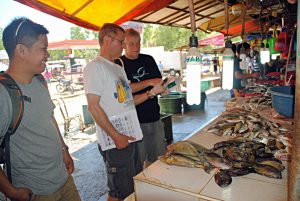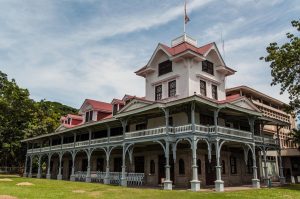______________
Overview
The Philippines PIRE Project Research Experience for Undergraduates (REU) Program occurred during the summers of 2018, 2019, and 2022. Unfortunately, due to the COVID-19 pandemic the REU Program was unable to run in 2020 and 2021. Undergraduate students selected from Old Dominion University, Texas A&M University – Corpus Christi, Rutgers University, and Arizona State University participated in the program alongside U.S. and Filipino students, early career professionals, and collaborating principal investigators to investigate anthropogenic impacts on temporal changes in the biodiversity of Philippine fishes.
The goal of the Philippines PIRE project was to compare the species- and genetic-level changes in Philippine fishes. The Smithsonian conducted a biodiversity assessment in 1978 and 1979 that was duplicated in 2019 and 2022, which investigated decadal changes in species diversity and community assemblage. Temporal changes in the genomic composition of fish populations was investigated by leveraging collections made by the R/V USS Albatross from 1907 to 1910. These collections were duplicated between 2017 and 2023 to sample the same fish populations to address the project’s central questions. Read our Major Goals page for the details. Motivated undergraduate students contributed directly to the research effort of the Philippines PIRE Project by participating in the project’s international REU Program. During the summer REU Program, REU participants conducted independent research projects, learned advanced genomic methodology, and received theoretical and hands-on training in the field and the lab. The Philippines provided unique opportunities for U.S. students through both the historical ties with the U.S. and because of its extreme concentration of marine biodiversity.
Objectives

- Introduce students to an integrated approach to research that incorporates the biological sciences, molecular ecology, bioinformatics, and marine biodiversity conservation
- Introduce students to the use of molecular tools to investigate changes in biodiversity over the last century
- Provide students an international research opportunity that promotes long-term collaboration, for research and education, with faculty, early career scientists and students
- Provide students with academic, professional, and personal skills to pursue careers in STEM
- Expose students to concepts of international collaboration and ethical conduct of research
- Students will participate in a 12 day workshop that introduces computing techniques for analyzing genomic data
- Students will have the opportunity to present their research at scientific conferences
- Certify students as IUCN regional assessors
- Students will participate in all aspects of the research effort to include:
- Pre departure training and orientation
- Research planning meetings
- Fish market visits, field observation, and collection of marine fishes
- Evaluating fish species for risk of local extinction by IUCN standards

Program Information
This was an 8-week paid international research experience, which included the following:
- $500 weekly stipend
- Per diem
- International and domestic travel from your home airport to Dumaguete, Negros Oriental, Philippines
- Travel to research sites
- Visas
- Accommodations
- Travel health insurance
Living & Research Environment
- Access to field sites in the epicenter of marine biodiversity
- Immersion in a collaborative, multinational academic environment at Silliman University
Eligibility
- Must be a citizen or permanent resident of the United States or its possessions.
- Must be a registered student at Arizona State University, Old Dominion University, Rutgers University, or Texas A&M University – Corpus Christi. We regret that we cannot accept students from other institutions. We highly encourage these students to apply to our partner program Philippines International Research Experience for Students.
- Must be in good academic standing.
- Must be a full-time rising sophomore, rising junior, or rising senior majoring in biological sciences or a related field (e.g. marine biology, genetics).
- Must have at least 2 semesters at an accredited institution prior to departing for the Philippines.
- Underrepresented minority students are particularly encouraged to apply.
- A completed application received by the program deadline published on the application page.
 Partnerships for International Research and Education (PIRE) is an NSF-wide program that supports international activities across all NSF supported disciplines. The primary goal of PIRE is to support high quality projects in which advances in research and education could not occur without international collaboration. PIRE promotes excellence in science and engineering through international collaboration and facilitates development of a diverse, globally-engaged, U.S. science and engineering workforce.
Partnerships for International Research and Education (PIRE) is an NSF-wide program that supports international activities across all NSF supported disciplines. The primary goal of PIRE is to support high quality projects in which advances in research and education could not occur without international collaboration. PIRE promotes excellence in science and engineering through international collaboration and facilitates development of a diverse, globally-engaged, U.S. science and engineering workforce.
Funding for this REU is provide by the National Science Foundation, Award #1743711. The NSF contact for this program is Cassandra Dudka. NSF does not handle REU applications; please contact each REU site directly for application information. NSF funds many REU programs. For other opportunities go here:
